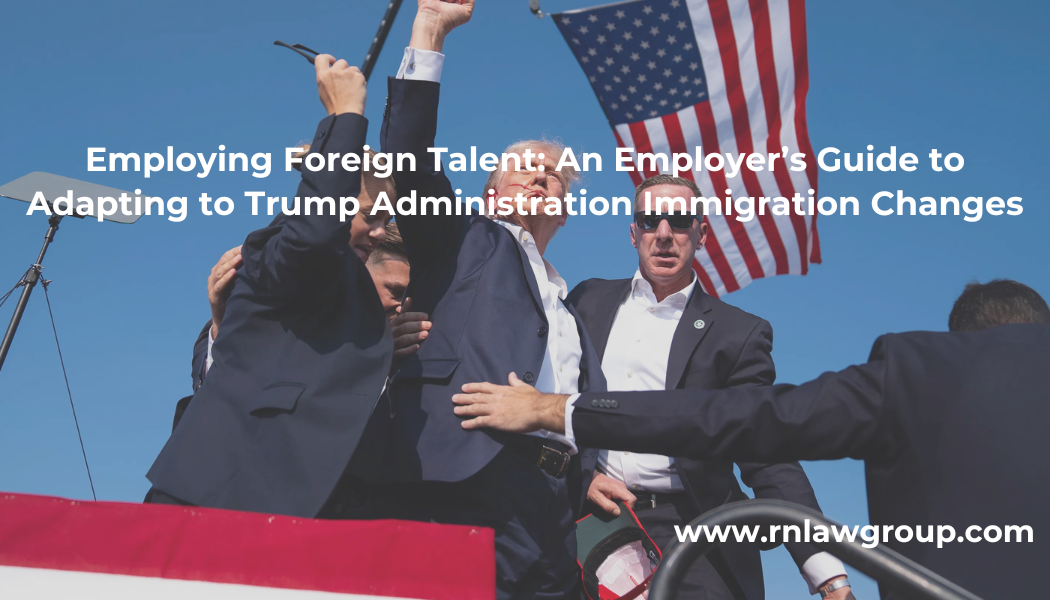
Employing Foreign Talent: An Employer’s Guide to Adapting to Trump Administration Immigration Changes
As the Trump administration takes office, companies employing foreign workers face a shifting immigration landscape that could impact their workforce strategy, visa processes, and compliance requirements. With campaign promises to tighten immigration controls, prioritize American jobs, and possibly overhaul key visa programs, it’s essential for businesses to proactively prepare for potential policy changes. From staying informed on emerging regulations to reinforcing internal compliance protocols, companies that employ foreign talent will need to adapt quickly to safeguard their operations and ensure seamless support for their international employees.
Strengthen Immigration Compliance: Reviewing I-9s, E-Verify, and Hiring Practices
To prepare for potential changes under the new administration, employers should proactively review their compliance posture, particularly concerning I-9 documentation, E-Verify enrollment, hiring practices, and public access files. Ensuring that I-9 forms are accurately completed for all employees and regularly audited can help mitigate risks associated with intensified enforcement efforts. Employers should also confirm that they are properly enrolled and actively participating in E-Verify if required, as this system may see expanded usage or more stringent monitoring. Reviewing hiring practices to ensure they align with nondiscriminatory guidelines is equally important, as compliance in this area can prevent inadvertent penalties. Additionally, for companies sponsoring H-1B employees, maintaining up-to-date public access files in accordance with Department of Labor regulations is essential to demonstrate transparency and avoid sanctions. A thorough review of these elements can strengthen compliance efforts and reduce exposure to legal and financial liabilities.
Prepare for Longer Visa Processing Times and Delays in Renewals
Employers should anticipate and prepare for extended processing times across various immigration-related tasks, including visa renewals, new applications at U.S. consulates, and compliance with additional interview and biometrics requirements. With the potential for heightened scrutiny and added security measures, routine processes that once moved quickly may now encounter delays. For instance, increased interview requirements could extend wait times at consulates, while mandatory biometrics for certain applications could add an extra step, further slowing down the timeline. Employers should plan accordingly, allowing extra lead time for employee visa renewals, onboarding new foreign hires, and any travel that involves visa processing. With potential delays in visa processing and travel restrictions, employers should develop contingency plans for remote work if employees are unable to reenter the U.S. or experience prolonged processing times at consulates. By anticipating these delays, companies can minimize disruptions and ensure a smoother experience for both the organization and its employees.
Adjust Immigration Budgets for Premium Processing, Wage Increases, and Possible RFEs
Given the potential for increased scrutiny and procedural changes in immigration processes, employers should consider revisiting their budgets allocated to immigration-related expenses. With standard processing times potentially lengthening, premium processing may become a necessary, albeit costly, option to avoid extended delays for critical applications. Additionally, employers may face rising prevailing wage requirements for certain visa categories, impacting the cost of maintaining compliance. The likelihood of receiving more Requests for Evidence (RFEs), facing audits, and encountering denials may also add unexpected expenses for legal support, document preparation, and appeal processes. Allocating additional funds to cover these potential increases will enable organizations to respond swiftly to these challenges, ensuring they can continue to support their foreign workforce effectively.
Be Prepared for FDNS Site Visits: Strengthening Internal Procedures and Compliance Readiness
Employers should proactively review and strengthen their internal procedures to ensure they are prepared for potential site visits from the Fraud Detection and National Security (FDNS) unit. Site visits may become more frequent under increased enforcement efforts, particularly for employers of H-1B, L-1, and other visa categories subject to heightened scrutiny. To prepare, employers should designate specific points of contact within their HR or compliance teams to handle site visit interactions and ensure these individuals are well-informed about FDNS protocols. It is also advisable to review employee records and maintain easily accessible documentation to demonstrate compliance with visa requirements, including wage and role verification for each foreign employee. Conducting internal audits and training staff on appropriate procedures for these visits can further strengthen readiness, ensuring that the company’s response is prompt, organized, and compliant.
Support H-4 EAD Holders: Explore H-1B Sponsorship and Alternative Visa Options
Employers should take the time to review their workforce for any employees holding H-4 Employment Authorization Documents (EADs), as these individuals could face the risk of losing their work authorization under potential regulatory changes. Identifying H-4 EAD holders and assessing their roles within the company is crucial to prepare for any possible disruptions. For high-performing H-4 EAD employees, employers might consider exploring alternative visa options, such as sponsoring them for an H-1B under the annual cap, which could provide more stable work authorization. Additionally, if employees qualify, other employment-based visa categories or even green card sponsorship could offer long-term security. Proactively addressing these options can help employers retain key talent, ensure continuity in critical roles, and provide affected employees with viable pathways to continue their careers.
Stay Updated on Policy Changes and Communicate with Affected Foreign Workers
Employers should prioritize staying informed on immigration policy changes, especially as new regulations or enforcement priorities may impact their foreign workforce. Regularly monitoring updates from reliable immigration sources or engaging with legal counsel can help companies anticipate shifts in policies and prepare accordingly. Equally important is maintaining open and transparent communication with affected employees, particularly those on temporary work visas or dependent statuses like H-4 EAD. Keeping these employees informed about potential policy changes, the company’s support measures, and alternative visa options can alleviate uncertainty and demonstrate the employer’s commitment to their career stability. Proactive communication not only enhances employee trust and morale but also helps companies retain critical talent by addressing concerns before they escalate.
By: Emily Neumann
Emily Neumann is Managing Partner at Reddy Neumann Brown PC with over 15 years of experience practicing US immigration law providing services to U.S. businesses and multinational corporations. Emily has helped transform the firm from a solo practice to Houston’s largest immigration law firm focused exclusively on U.S. employment-based immigration. She received her Bachelor’s degree in Biology from Central Michigan University and her Juris Doctorate degree from the University of Houston Law Center. Emily has been quoted in Bloomberg Law, U.S. News & World Report, Inside Higher Ed, and The Times of India on various hot topics in immigration. She is a member of the American Immigration Lawyers Association and Society for Human Resource Management.

